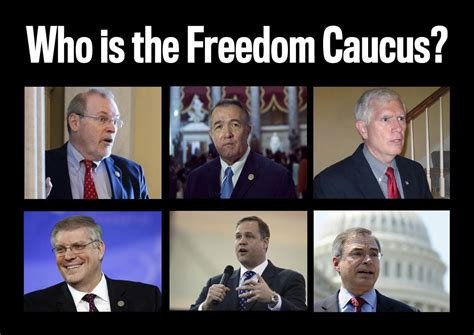
Unlocking the Influence of the Freedom Caucus: A Comprehensive Overview
Founding and History:
The Freedom Caucus, a group of staunch conservative members of the Republican Party, significantly shapes the United States’ legislative direction. Formed in [insert year], this caucus has played an instrumental role in promoting a fiscally responsible and limited government agenda. It responded to the perceived drift from conservative principles by some Republican representatives and has since become a force within the party. The Freedom Caucus, with its unyielding commitment to advancing conservative values, garners both support and criticism, leading to significant discussions within the broader political spectrum.
Principles and Ideals that Drive the Freedom Caucus
Principles and Ideology:
The Freedom Caucus is guided by a set of conservative principles and ideologies at its core. Its members commit to reducing government intervention in the economy, advocating for lower taxes, and promoting individual freedoms. The caucus staunchly believes in the concept of limited government and upholding states’ rights. These principles often manifest in their policy positions, which lean toward reducing the size and influence of the federal government.
Membership and the Far-Reaching Influence
Membership and Influence:
The Freedom Caucus maintains stringent membership criteria. Prospective members must commit to the core conservative values upheld by the caucus and prioritize these values in their legislative decisions. Despite its relatively small size within the broader Republican Party, the caucus wields significant influence.
The Freedom Caucus exerts its influence in various ways. One of the most notable methods is through the role its members play in shaping the legislative agenda. With a united front, the caucus can pressure party leadership to prioritize conservative policies. They have shown their willingness to challenge party leaders and vote against bills that do not align with their principles.
As a cohesive group, the Freedom Caucus can also endorse and support candidates during primary elections. Their endorsement carries considerable weight among conservative voters and can significantly impact primary race outcomes.
Controversies and Critical Scrutiny
Controversies and Criticisms:
The Freedom Caucus’s unwavering approach to governance has generated both support and criticism. While many admire their commitment to conservative principles, others view it as a hindrance to effective governance. Some critics argue that the caucus’s unwillingness to compromise on certain issues can lead to legislative gridlock and government shutdowns.
One of the most significant controversies surrounding the Freedom Caucus is its role in government shutdowns. The caucus has, at times, taken a hardline stance on certain issues, leading to funding disputes and legislative standoffs. While these actions aim to draw attention to their causes, they have also sparked debates about the appropriateness of using government shutdowns as a negotiating tactic.
Key Policy Positions that Define the Caucus
Key Policy Positions:
The Freedom Caucus is known for its strong positions on various policy areas, often reflecting their conservative principles. One of the prominent policy positions of the caucus is its stance on healthcare. They have consistently advocated for repealing and replacing the Affordable Care Act, also known as Obamacare, arguing that it represents government overreach and negatively impacts the economy.
Another key policy area for the Freedom Caucus is immigration. Members have called for stricter border controls and enhanced enforcement of immigration laws. They believe that securing the borders is essential for national security and preserving the rule of law.
Social issues are also significant concerns for the Freedom Caucus. They take conservative stances on matters such as abortion rights, advocating for pro-life policies, and supporting religious liberty and traditional family values.
Key Players and Leaders within the Caucus
Key Players and Leaders:
The Freedom Caucus comprises numerous influential members, each playing a crucial role in shaping the group’s actions and positions. Some of the key players within the caucus include [insert names], who have emerged as prominent representatives of conservative values within the Republican Party.
The caucus also has a leadership structure that helps guide its activities and ensure a unified approach to key issues. Leadership positions are often determined through internal elections, and those who hold leadership roles have an increased responsibility in shaping the caucus’s direction.
Role in Government Shutdowns: Strategies and Outcomes
Role in Government Shutdowns:
The Freedom Caucus’s role in government shutdowns has been a point of both praise and criticism. Supporters argue that using government shutdowns as a tactic draws attention to important issues and puts pressure on the opposing party to consider their policy positions seriously.
Opponents of the caucus’s approach view government shutdowns as harmful to the economy and public trust in government institutions. They argue that these actions disrupt government operations, affecting federal employees and essential services.
The Freedom Caucus maintains that, in certain cases, a government shutdown is necessary to achieve their policy goals and signal the importance of certain issues to their constituents.
Relationship with the Trump Administration
Relationship with the Trump Administration:
During the Trump administration, the Freedom Caucus generally aligned with President Trump’s policy agenda. However, there were instances where the caucus’s positions diverged from the administration’s priorities, leading to some tensions within the Republican Party.
The caucus expressed support for many of President Trump’s key initiatives, such as tax reform and deregulation, which were in line with their conservative principles. However, they also raised concerns about certain spending proposals and called for more significant efforts to address the national debt.
Influence on Congressional Elections
Influence on Congressional Elections:
The Freedom Caucus has become a sought-after endorsement for conservative candidates in congressional elections. Their endorsement can significantly boost a candidate’s chances, especially in competitive Republican primaries.
Endorsement by the caucus signals to voters that a candidate aligns with conservative principles and is committed to advancing their agenda. Candidates who receive the endorsement of the Freedom Caucus often gain additional support from conservative donors and organizations.
Comparison with Other Congressional Caucuses
Comparison with Other Congressional Caucuses:
The Freedom Caucus is distinct from other congressional caucuses due to its strong ideological focus and unwavering commitment to conservative principles. While other caucuses also advocate for specific issues or represent specific interests, the Freedom Caucus is unique in its emphasis on limited government and fiscal responsibility.
Despite these differences, there are instances where the Freedom Caucus collaborates with other caucuses to achieve shared policy objectives. This collaboration highlights the fluid and dynamic nature of congressional politics and the pursuit of common ground when possible.
Future Prospects and Challenges Ahead
Future Prospects:
The future of the Freedom Caucus depends on its ability to adapt to the changing political landscape and its capacity to maintain relevance within the Republican Party. As American politics continues to evolve, the caucus faces both challenges and opportunities.
With the 2024 elections approaching, the caucus will have a crucial role in shaping the party’s platform and identifying candidates who align with its conservative principles. Additionally, as new policy challenges emerge, the caucus will need to articulate positions that resonate with their constituents while working to build broader support within the party.
While the Freedom Caucus’s approach has drawn both praise and criticism, its role in the Republican Party is likely to remain significant for the foreseeable future.
The Freedom Caucus stands as a formidable force within the Republican Party, championing conservative principles and advocating for limited government and fiscal responsibility. Since its founding in [insert year], the caucus has played a pivotal role in shaping the party’s legislative direction and pushing for policies aligned with its ideology.
As a group of like-minded representatives, the Freedom Caucus has influenced congressional debates, impacted policy decisions, and left a mark on American politics. While its approach has sparked controversies and garnered
Learn More:
The Heritage Foundation: The Heritage Foundation is a well-known conservative think tank that provides in-depth analysis and research on a wide range of political topics, including the Freedom Caucus and conservative principles.
The Hill: The Hill is a reputable news source that covers U.S. politics extensively. You can find articles, opinion pieces, and analysis on the activities and impact of the Freedom Caucus and other political developments.
Politico: Politico is another respected news outlet that offers comprehensive coverage of U.S. politics. You can explore articles and reports related to the Freedom Caucus, its role in Congress, and its influence on policy.
